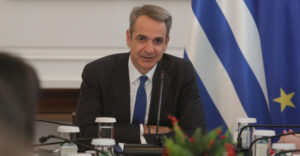Hello, a brief comment on the markets after Trump’s pirouette last night to suspend, except for China, for essentially 90 days the major tariff hikes on the rest of the world. Clearly, the PotUS… is giving himself time to reconsider after the collapse of the American stock market, which he cares about. The continuation will play out on screen, but the end of the thriller is unknown, as no one can yet predict it.
Who’s the lucky one?
Now on to our own affairs—early yesterday morning, Kostas Kyranakis walked through the door of the Prime Minister’s office. I wasn’t there, but most likely they’re looking for the kamikaze who will take Papadimitriou’s place at EODASAAM (or whatever it’s called). Now, the other thing I learned—it’s likely that by the end of the year, Kyranakis will be in a position to present some fairly substantial work regarding train safety. And to be fair to people, the prevailing opinion in the Maximos Mansion is that the much-discussed report was a thorough investigation of what happened that fateful night, of the chaos at OSE, and of course it included the “pyrosphere chapter,” which was frankly pitiful. But of course, the opposition, instead of doing… actual opposition on everything else, went straight for the easy solution of the conspiracy theorists with the xylol. I repeat, what matters is that the families of the victims be left in peace, that the trial begins and responsibilities are assigned, and of course that the trains be fixed.
Polls
Now, since yesterday and today, the first “post-xylol” polls are surfacing, from which it appears the government is catching a breather as the political atmosphere around Tempi is easing, and I find that logical. I’m told a clearer picture will emerge after the Easter holidays when people have gone out for their strolls.
Hatzidakis
I asked my source at the Maximos Mansion how the new structure is going, and they told me “Hatzidakis has rolled up his sleeves and is trying to bring some order. After all, his arrival here, so we could all function together with the ministers, was… our last hope.” Right. So I wonder what was happening before—just as I wonder what it is that keeps throwing them off. Hatzidakis, though, has also started meeting with MPs, taking note of their concerns. For example, the day before yesterday he was at Maximos and met with Vasilis Ypsilantis from the Dodecanese, who dropped the legendary line during the parliamentary group session about the emirs and the wretches. Others will be coming in the next few days as well.
Sdoukou
One of the surprises of the reshuffling of ND’s communications team was the appointment of former Deputy Minister of Environment Alexandra Sdoukou as ND’s spokesperson. Sdoukou, for some reason, has passed into common consciousness as “PASOK-origin,” because she once worked in the office of then-Environment Minister Giannis Maniatis. Still, Sdoukou has been a member of ND since she was 19 and entered politics alongside former Karamanlis-era minister Christos Folias, and as a permanent employee of the Ministry of Environment she developed her career next to all the ministers.
We’re in serious trouble
Ray Dalio of Bridgewater (the largest hedge fund globally) says we’re facing the greatest collapse of the political and economic order. Crises like this, he says, occur once in a lifetime and lead to geopolitical, monetary, and political upheavals. He warns that the major disruptions for investors haven’t yet arrived. Goldman Sachs’ private banking, in a note sent to major clients, states there’s a strong likelihood that downward pressures will continue until valuations fully price in the recession scenario—this implies weak stock markets, wider credit spreads, a deep cycle of rate cuts, and a long period of stock price fluctuations. At the same time, major investment organizations are deciding not to proceed with purchases and to revisit their investment decisions if the S&P 500 drops toward 4,500 points. The suspension (except for China) of tariffs for 90 days changed the market sentiment and U.S. stock markets skyrocketed last night. But given how things are, every day is a different day and we don’t know what tomorrow will bring.
National Bank and Alpha Trust
Life goes on, however, and the column relays from a reliable source that indeed discussions—intense discussions, in fact—are taking place between National Bank and Alpha Trust. Caution though: this does not mean that they’ve reached an agreement, nor that they ultimately will. Faidon Tamvakakis has his own views and is generally not considered likely to easily decide to sell the company. But there are also other shareholders in Alpha Trust. National Bank has the smallest amount of assets under management in asset management, and such a deal would make sense. After all, many talks start and then collapse. Even H. Megalou had made two previous attempts before finally reaching an agreement with National Insurance, which didn’t pan out. Still, the uncertainty prevailing in the markets at the moment can just as easily accelerate or freeze deals.
Alarm at central banks and the SSM
In general, the situation in the markets is causing growing concern among central banks, as recession scenarios for the global economy are now on the table. The rhetoric for rate cuts at the ECB is gaining strength, while the Bank of England issued a warning yesterday about potential “sudden market corrections,” alerting to heightened systemic risk. In short, the supervisors are on high alert. Let’s hope that the state of emergency signaled by the central banks doesn’t bring any unpleasant surprises for Greek banks from the SSM.
Activity (amid the storm) in banks
During Easter week, Dutchman Henry Holterman will announce that he finally received fit & proper clearance from Frankfurt and will be able to increase his stake in Alpha Bank. At the same time, bank administrations are trying to adapt to the new era of reduced interest income and are therefore seeking to generate more income from fees. The administrations of Greek banks believe there is significant room to increase revenues from “Fees and Commissions,” that is, from insurance services, asset management, and investment banking services. That’s why bank administrations will allocate a portion of their available liquidity to acquisitions of insurance companies, asset management firms, and investment banking outfits. After AXIA VG, Alpha is considering new moves; Piraeus is trying to speed up the integration of National Insurance into its consolidated balance sheet; and as for National Bank, we discussed that earlier.
Meanwhile in tourism, they’re living in another world
And since Greeks don’t flinch at international crises, anyone trying to book a hotel or room in one of the well-known—not the super expensive international—Greek summer destinations will find that many are living in their own world. They’re not worried about the crisis or the potential drop in tourism traffic. They demand the high prices of previous record-breaking years, as if nothing has changed. When a hotel room in Skiathos or Skyros reaches 450 euros per night, it seems the news hasn’t yet reached our islands.
Cyberattack bill finally at 20 million euros
The issue with the cyberattack on the Fourlis Group continues, as the bill has grown. Management estimated a loss of 15 million euros in sales, but that amount concerns 2024. For 2025, another 5 million euros is added to the bill, as stated yesterday by the group’s management at the Hellenic Fund and Asset Management Association, bringing the total to 20 million euros. This happened because the cyberattack occurred in late November last year, and as a result, the operation—mainly of IKEA and online sales—was affected until last February. Therefore, the impact extended into the first quarter of 2025.
Fourlis’ explanation
Now, the company states that there was no specific figure being hidden, and therefore it wasn’t possible to warn investors about the extent and impact of the cyberattack before the announcement of the 2024 financial results, as there wasn’t a clear picture of the damage. They also emphasize that they managed to meet the earnings guidance by cutting expenses during the incident—on advertising, labor hours, etc.—and by obtaining special one-off support discounts from suppliers. As we mentioned yesterday, in stock markets, listed companies must provide shareholders with a clearer picture regarding events that impact their financial figures to ensure full and equal disclosure. After all, listed companies have a legal obligation under the regulatory framework to disclose events that affect their financial statements. When the cyberattack occurred, a statement was issued by Fourlis about the incident, but not regarding the financial impact, something which also depends on its magnitude. In any case, it seems the incident was taken seriously by Fourlis’ management, which says it is investing in cybersecurity and the resilience of its IT systems.
Second airport transfer to Quest?
We don’t sign contracts, but in the market, there’s a circulating rumor—from reliable but unconfirmed sources—that starting this coming Fall, once the six-month gardening period from his departure is completed, the former CEO of Vodafone Greece, Haris Broumidis, will assume a top position within the Quest Group. I don’t dismiss this lightly, as another prominent manager in the telecommunications sector, Michalis Tsamaz, also joined the Quest workforce after his time with OTE.
The new move of the Arab billionaire
Amid general chaos and disruption, Arab billionaire Tahnoon bin Zayed Al Nahyan is preparing his next investment move on Greek soil. This was indicated by the establishment, yesterday, Wednesday, April 9, of a new company under the name “Diskouri Hills S.A.E.,” with its main objective being the development of hotels and similar accommodations. The company, headquartered in the municipality of Chalandri, has an initial share capital of €10,138,000 and a sole shareholder, “AlfaJ Propco Holdings RSC Ltd.” During the notarial procedures in late March, journalist (and former head of the National Intelligence Service under SYRIZA) Giannis Roubatis appeared as its representative. As is well known, he has collaborated with the Arab tycoon in recent years. Thus, in the company’s first Board of Directors, Maria Savva (wife of G. Roubatis) was appointed as President and CEO, with Sofia Lasky and Nars Mohamed Abuzaid Ahmed as members. Regarding the share capital, €7,991,280 is to be paid immediately, and the remaining €2,146,720 by March 2026 at the latest. Tahnoon bin Zayed Al Nahyan made his debut in Greece in the summer of 2019, when, through Druzy S.A., he acquired the impressive property of G. Tsiveles on Dionysiou Areopagitou Street, which is still listed for sale at €48 million. This was followed by the acquisition of the old “Club Ermioni” hotel in Porto Heli, which spans an area of 220 acres, with the aim of transforming it into the ultra-luxurious tourist resort “Scarlet Beach Hotel,” a €203 million project included among strategic investments, as well as the acquisition of olive groves in Ermioni and Messinia and a packaging unit in Ilia, through which he is already producing high-quality extra virgin olive oil.
Greek presence at Eurofi
The Chair of the Hellenic Capital Market Commission, V. Lazarakou, is speaking today on a Eurofi panel on the topic of “T+1 settlement: next steps and impact on the Capital Markets Union.” The moderator is ESMA Chair Verena Ross, while also participating in the panel as experts are: G. Sabatini, Chair of the dedicated committee on the T+1 transition, representatives from the Dutch supervisory authority, R. Knox, Director of the UK Treasury, and from the market: H. Boucheta of BNP, V. Wotton, Managing Director of DTCC, and M. Bayle, CEO of CLS. Eurofi is a European think tank focused on financial sector regulation and supervision. It organizes two high-level conferences each year, held ahead of informal meetings of EU finance ministers (Ecofin), where the latest developments in the financial sector and market trends are discussed.
As many transactions in 4 sessions as in the entire April 2023
Times have changed; movements on the Athens Stock Exchange now carry weight and substance. In the last four sessions, the total transaction value equals that of the entire month of April 2023. At the same time, it’s becoming clear that the herd instincts of our market are subsiding, and gradual differentiations are starting to emerge. In yesterday’s session, for example—despite the new dramatic drop in the General Index—22 stocks closed in positive territory. Standing out was dividend-distributor OPAP (+0.51%) at €17.77, maintaining its market cap at €6.5 billion, OTE (+0.75%) which found support at €14.87, and the… billionaire Aegean (+0.18%) at €11.18, which has budgeted for 2025 based on an average oil price of $75 per barrel and is already benefiting from the black gold being under $60. All this suggests that some defenses are slowly being built, though it should not be overlooked that “these are not times to wait idly,” and aggressive selling is not advisable at this stage. The General Index slid again yesterday, down -2.69% to 1,528.34 points, with transaction value at €257.9 million. Significant losses of -2.78% for the large-cap index at 3,755.66 points and also for the Banking Index (-3.14%) at 1,395.66 points. All this was happening while the desperate American President took to social media—without pretense or nuance—urging Americans to buy stocks now, claiming a major investment opportunity. At the same time, within just three days, the yield on the 10-year U.S. bond rose by 60 basis points, while the S&P 500 fell by -8%. This was the largest three-day increase in borrowing costs since 1982 and one of the greatest divergences in history. Back in Athens, the good news of the day was the defense of the 1,500-point stronghold of the General Index, despite the fact that at one point yesterday noon it had plunged to 1,496.42 points (-4.72%), ultimately closing at 1,528.34 points with a -2.69% drop. In the final auctions, the General Index gained about 10 points.
We’re living in 2008 again
Insecurity, uncertainty, and—above all—a lack of trust in institutions, even in banks. Starting tomorrow, the U.S. banks will kick off the Q1 2025 earnings season. Obviously, the figures of the first 90 days of 2025 no longer hold any real significance. Analysts and investors are looking for answers on how bank portfolios are being affected by the explosive rise in bond yields, how loan demand is being suppressed, how asset quality is deteriorating, how forecasts for the U.S. GDP are being revised, and—last but not least—how great the risk of bankruptcy once again is for some of the 4,000 U.S. banks. All this mirrors the confidence crisis era of 2008–2009. Moody’s has already issued warnings about a potential downgrade of the creditworthiness of the U.S. economy. All this is happening while Trump’s economic team is reportedly planning to extend the duration of U.S. bonds to 50 or even 100 years.
The crisis is sweeping through cryptocurrencies
The major cryptocurrency market has lost 25% of its value since the triumphant election of Trump in November. The crypto market isn’t backed by fundamentals, only by available liquidity—which is now drying up and going into hiding. Bitcoin lost its “technical support” at $85,000 on the day Trump announced his tariff policy from the Rose Garden, and since then, it has been steadily declining, now below $76,000. Ethereum and Ripple (XRP) followed BTC’s lead and continued their downward trend. Technical analysis now points to $73,000 for Bitcoin, $1,300 for Ethereum, and $1.30 for Ripple. Ethereum’s price dropped nearly -13% last week after failing to close above the daily level of $1,861. Since the tariff announcement, the total market capitalization of cryptocurrencies has fallen by approximately 25.9% from January highs, losing about $1 trillion in value. Bitcoin (BTC) dropped 19.1%, Ethereum (ETH) fell by more than 40%, and high-beta categories like Memecoins and Artificial Intelligence (AI) tokens plunged by more than 50%. Since millions of Americans—and not just them—had come to believe cryptocurrencies were the answer to the savings dilemma, these fluctuations could trigger serious social unrest.
Trump, 10-Year Bonds, and the Art of the Deal
In the days following the announcement of the U.S. tariff policy, President Trump had declared: “Oil is falling, bond yields are falling, our policy is working.” Yesterday, however, the 10-year U.S. government bond was yielding 4.41% (up from 4.18% just a day earlier), while the 30-year bond touched 5%. These represent the largest single-day price drops (i.e., yield increases) of the past two decades. The original goal of lowering interest rates—and essentially reducing the cost of servicing the colossal $7 to $9 trillion debt that required immediate refinancing—is beginning to vanish. At $1.2 trillion, the current debt servicing cost already exceeds the country’s defense budget. Many believe that China is behind this upheaval, as it still holds $761 billion worth of U.S. government bonds. On X (formerly Twitter), users have been speculating—half-jokingly, half-seriously—how far the President of the United States (PotUS) might go. Would he dare to even hint at a default on U.S. bonds? For Greeks, of course, such a threat is far from unfamiliar and evokes painful memories of the past…
Ask me anything
Explore related questions





